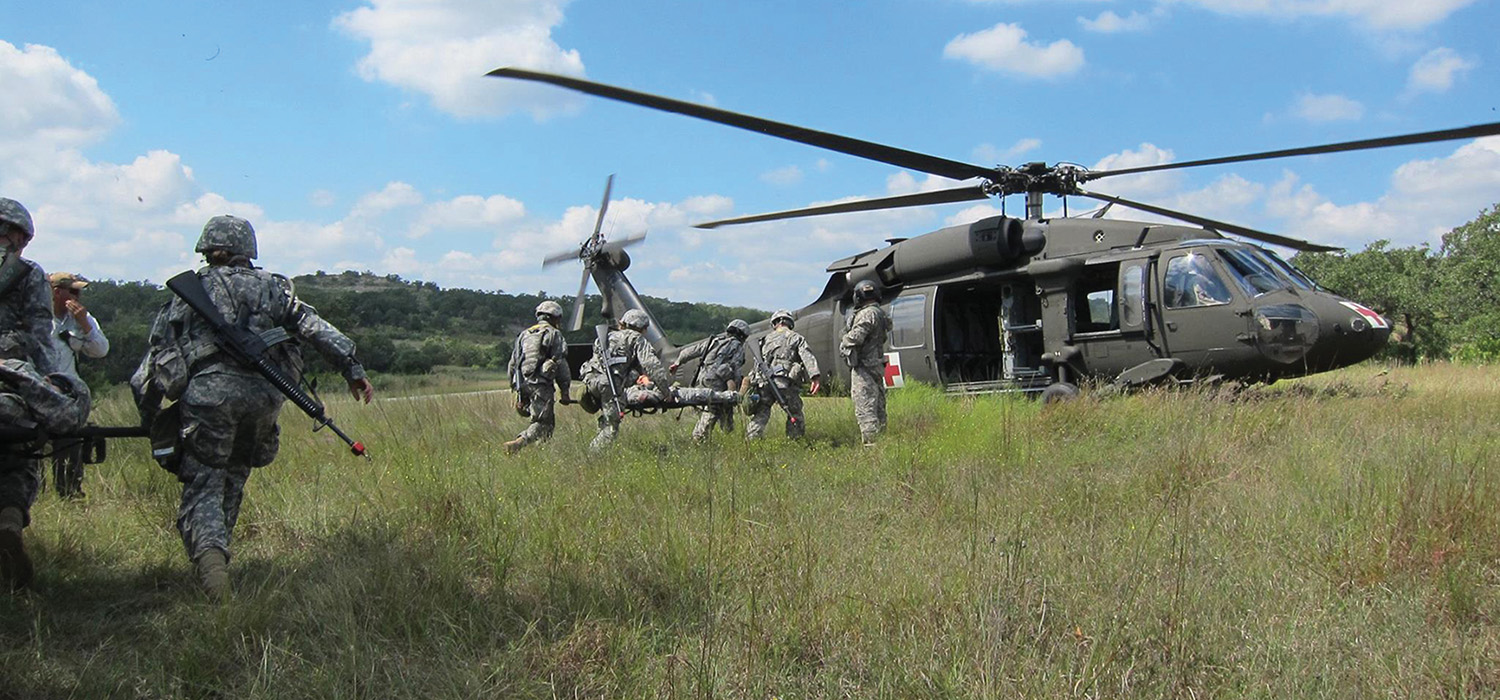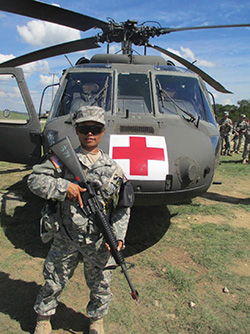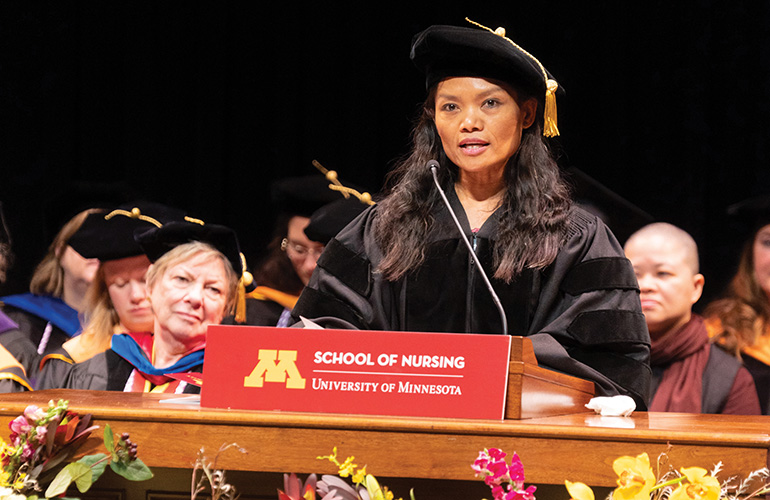Lessons learned in Philippines farm fields provide drive to be leader in the field of nursing
Arlene Corpuz, DNP ’22, is prepared to leverage informatics solutions to support the health of veterans
November 13, 2023
Brett Stursa

Above: Corpuz served as a nurse flight attendant on a medical evacuation team responsible for transporting patients in a Blackhawk helicopter.
The farm in the northern Philippines that Arlene Corpuz, DNP ’22, RN, grew up on was both a source of fun as a playground and the source of many lessons in responsibility, as she tended to animals and herded goats.
It was also where her parents instilled the importance of an education. Now, as a recent Doctor of Nursing Practice graduate with a specialty in nursing informatics, Corpuz is prepared to leverage technology and informatics solutions to support the unique health care needs of veterans.
Realizing the potential of technology to improve patient care
At 16 years old, Corpuz left her family’s farm and attended college in Manila to earn a degree in computer science. After graduation, she secured a job in Japan as a factory worker and eventually immigrated to the United States. Influenced by her mother-in-law who was a nurse, Corpuz pursued a nursing degree. The degree led her to join the military, where as an Army nurse she had the opportunity to serve in various health care areas.
She began in the medical surgical unit, then trained in the mother-baby unit and eventually moved to the emergency department while being stationed first at Fort Irwin, California, and then at Walter Reed National Military Medical Center, which is the world’s largest joint military medical center.
“One of the most memorable experiences in my military career was being a nurse flight attendant on the medical evacuation team responsible for transporting patients in a Blackhawk helicopter,” she says. The role involved coordinating with the flight crew, preparing patients for transport, and ensuring their safety and stability throughout the flight.
“It was a high-pressure environment that required quick decision-making and effective communication with the rest of the medical team,” says Corpuz, adding that in the Army she was never alone in her responsibilities. “We had an exceptional team that worked together seamlessly to ensure everything went smoothly. Collaboration and teamwork were paramount in our operations.”
During her time at Walter Reed, she collaborated with the chief nursing officer to design and build a secure internal information-sharing portal for more than 5,000 health care professionals. “Through my experiences, I realized the immense potential of technology to improve patient care, streamline health care processes and enhance communication among health care professionals,” she says.

Her time in the Army was cut short due to medical reasons, retiring as a captain. However, the experience she gained as an Army nurse, particularly at Walter Reed, gave her direction for her new career path.
“I believe that well-implemented informatics systems can lead to better outcomes and more efficient care delivery. I also believe that nursing informatics can greatly impact patient safety, data management, and evidence-based decision-making, and I wanted to be at the forefront of these developments,” she says.
Despite the challenges associated with the transition, the decision to pursue a doctoral degree enabled her to be more involved in her children’s lives while contributing to the field of nursing informatics.
She chose to pursue a Doctor of Nursing Practice degree at the University of Minnesota because of its reputation in the field of nursing informatics and because of her fondness of the area, which was her first home after emigrating from the Philippines.
Transformative education
She says the program at the School of Nursing provided her with a solid foundation in advanced nursing practice and equipped her with the necessary skills to excel in the field of nursing informatics. “My time in the DNP program at Minnesota was truly transformative,” says Corpuz.
Learning from faculty who are experts in their field, they offered her valuable insights, guidance and mentorship.
Courses covered topics such as health care data management, informatics systems implementation and health care policy. She also engaged in hands-on learning through practicums at Optum and the VA Medical Center, where she applied what she was learning in the classroom.
“I had the chance to collaborate and learn from my peers, who came from diverse backgrounds and brought unique perspectives to the table,” says Corpuz. “We engaged in group discussions, shared our experiences, worked together on challenging assignments and fostered a supportive learning environment.”
Now, she’s confident she’ll be able to make a positive impact in the field of nursing informatics. “Overall, my time in the program was enriching and empowering, and prepared me to effectively utilize informatics in health care practice,” says Corpuz.
Inspired to make an impact in the lives of veterans
After graduating, Corpuz took time to rejuvenate at her home in western Wisconsin with her two daughters, ages 11 and 15, and her husband, Patrick Rebman. She is hoping to secure a position at the Department Veterans Affairs or the Department of Defense as a nursing informatics specialist, preferably remote so she can work from anywhere and explore the world with her husband. As a nursing informatics specialist, she will implement and optimize health information systems, manage data and analytics, and support the integration of technology to enhance patient care. “I will collaborate closely with health care teams, analyze workflows, and ensure that informatics tools are effectively utilized to improve health care delivery and enhance patient outcomes,” she says.
She’s excited by the potential to make a positive impact on the lives of veterans. “By harnessing the power of informatics, we can streamline processes, improve access to care, enhance data-driven decision-making, and ultimately provide better health care services to those who have served our country,” says Corpuz.

Arlene Corpuz, DNP ’22, RN, spoke on behalf of doctoral students at the University of Minnesota School of Nursing’s commencement ceremony on May 15, 2023. Corpuz shared her journey growing up on a farm in Manila, becoming a factory worker in Japan, and then moving to the United States and joining the U.S. Army. “As we stand here witnessing the American dream alive and well, let us never forget that we have the power to chase our dreams and make a difference in the world,” said Corpuz. Watch her deliver her remarks at z.umn.edu/corpuz.

